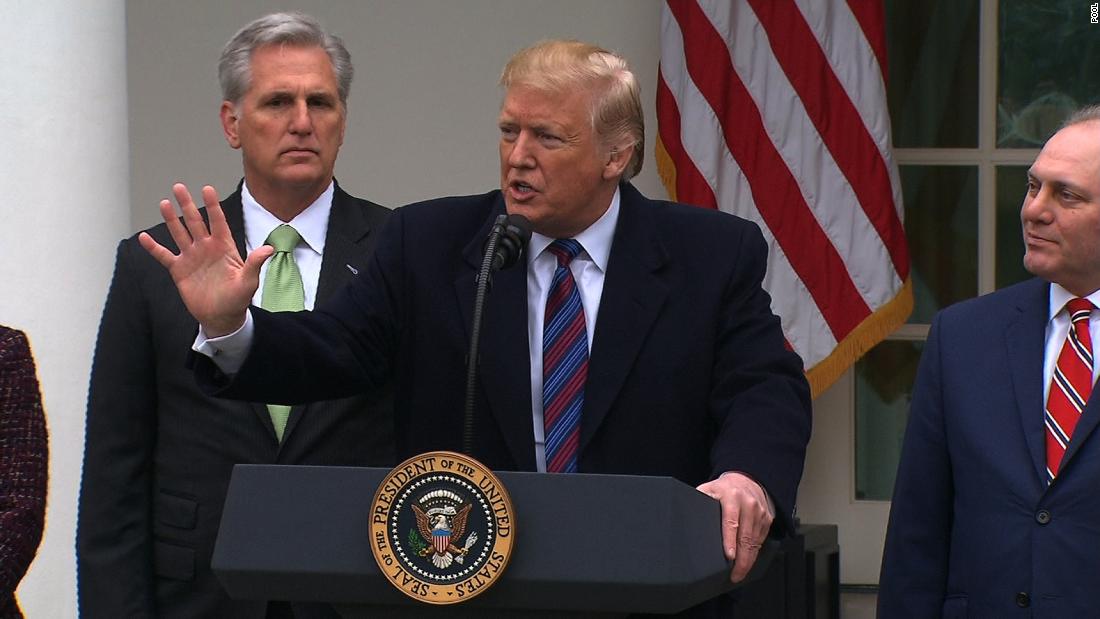[ad_1]
“We can call a national emergency because of the security … I haven’t done it. I may do it but we can call a national emergency and build it very quickly,” he said during remarks in the White House Rose Garden.
Trump has repeatedly talked about declaring a national emergency in recent months but hasn’t followed through yet, allowing the government to shut down over funding the wall rather than declaring one.
On Friday, he seemed to indicate that he would prefer to secure the funding through Congress.
“If we can do it through the negotiating process, we’re giving that a shot,” he said.
However, Trump also said he believes he doesn’t need congressional approval to build the wall.
“Absolutely,” Trump replied. “We can call a national emergency. I haven’t done it. I may do it. I may do it. We can call a national emergency and build it very quickly. It’s another way of doing it.”
Asked if that was a threat to Democrats, Trump said: “I never threaten anybody, but I am allowed to do it — call a national emergency.”
In December, defense officials from the Homeland Defense section of the Pentagon visited the White House for a meeting to discuss the possibility, three US officials have told CNN.
The meeting, which included officials from the Department of Homeland Security, focused on options that would allow Trump to build the border wall by tapping into military funding if he was unable to secure the money he wants from Congress.
Two officials said that the Pentagon believes that there is roughly $1-2 billion that could be set aside from the Defense Department budget to fund this effort.
A US official tells CNN that there is other money available that Trump could use for the emergency spending of construction funds but that he would have to cancel existing military construction projects to do so. Most of those projects are intended to improve readiness which the Pentagon has repeatedly stressed is a major priority.
According to this official, there are $13 billion in obligated funds from prior years that have not yet been spent and $10 billion in FY 19 funds already earmarked for various military projects, examples of which include building a fire station at Quantico, improvements at a Navy SEAL training facility and F-35 vertical landing pads in California.
The cancellation of any of those projects could upset Congressional members from those districts.
Trump would also be forced to deal with project termination costs for unspent funds from previous years and lawmakers may resist giving the Pentagon that money again in the future, the source said.
“The idea that President Trump is considering declaring a phony national emergency as a pretext to take billions of dollars away from our troops and defense priorities in order to pay for his wall should alarm all Americans,” Sen. Jack Reed, the ranking Democrat on the Senate Armed Services Committee said in a statement.
“Declaring a trumped up national emergency in order to skirt congressional approval is wrong. And our troops and taxpayers should not bear the burden of a broken, preposterous campaign promise,” he said.
Using this legal authority to construct border barriers was opposed by Democrats in the House and Senate in letters to then Defense Secretary James Mattis.
The officials said that while no formal direction or orders have been given to tap these funds, defense officials believe that the White House will move to direct the Pentagon to act should Congress prove unable to provide the necessary funding.
In December, several Democratic senators sent a letter to Mattis expressing opposition to the use of military funds for construction of a border barrier.
“We understand that the department is currently examining other authorities for this roughly $450 million project outside of the budget request process, specifically the potential use of 10 U.S.C. 2808 and 10 U.S.C 284,” the letter said.
“As you know, outside of a few small locations requiring security measures for weapons of mass destruction shortly after 9/11, 10 U.S.C. 2808 has never been used inside the United States. We urge you in the strongest possible fashion to refrain from considering using this authority or 10 U.S.C. 284 for this potential $450 million border wall project,” it added.
[ad_2]
Source link


